Elaris Jaco VS Hyundai i10 – Specs, Efficiency & Price Comparison
Which model is the better choice – the Elaris Jaco or the Hyundai i10? We compare performance ( vs 90 HP), boot capacity ( vs 252 L), efficiency ( vs 4.90 L), and of course, the price ( vs 14600 £).
Find out now which car fits your needs better!
The Elaris Jaco () is powered by a engine and comes with a transmission. In comparison, the Hyundai i10 (Hatchback) features a Petrol engine and a Manuel or Automatic gearbox.
When it comes to boot capacity, the Elaris Jaco offers , while the Hyundai i10 provides 252 L – depending on what matters most to you. If you’re looking for more power, you’ll need to decide whether the of the Elaris Jaco or the 90 HP of the Hyundai i10 suits your needs better.
There are also differences in efficiency: vs 4.90 L. In terms of price, the Elaris Jaco starts at , while the Hyundai i10 is available from 14600 £.
Compare all the key specs now and find out which model fits your lifestyle best!
Elaris Jaco
The Elaris Jaco is a testament to modern electric vehicle design, offering a unique blend of style and efficiency. Its sleek exterior is complemented by a high-tech interior that prioritises driver comfort and connectivity. This innovative car embodies the future of urban mobility, focusing on sustainability without compromising on performance.
detailsHyundai i10
The Hyundai i10 impresses with its compact design, making it an ideal choice for navigating through busy urban environments. Its interior is surprisingly spacious, offering drivers and passengers comfort beyond what one might expect from a city car. The model combines efficiency and practicality, making it an attractive option for those seeking both economy and functionality in their daily commute.
details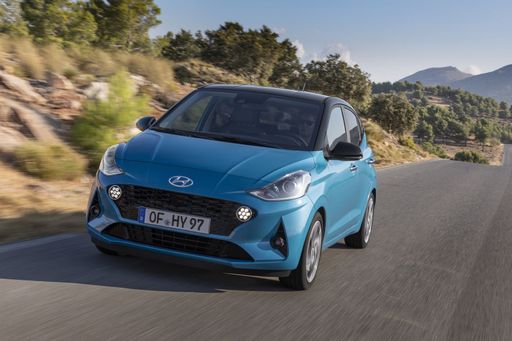 @ hyundai.news
@ hyundai.news
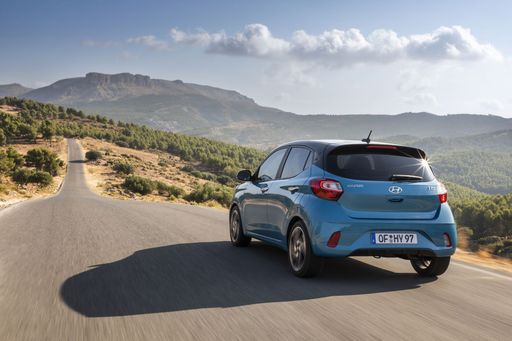 @ hyundai.news
@ hyundai.news
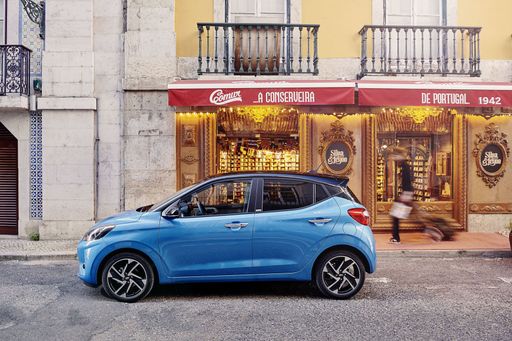 @ hyundai.news
@ hyundai.news
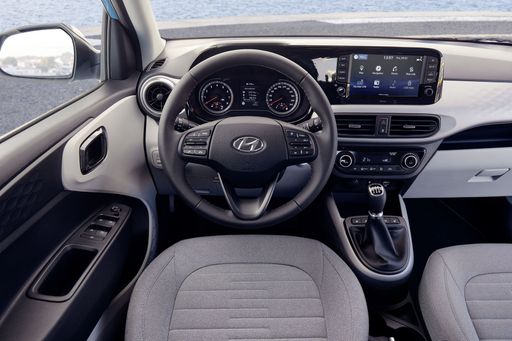 @ hyundai.news
@ hyundai.news
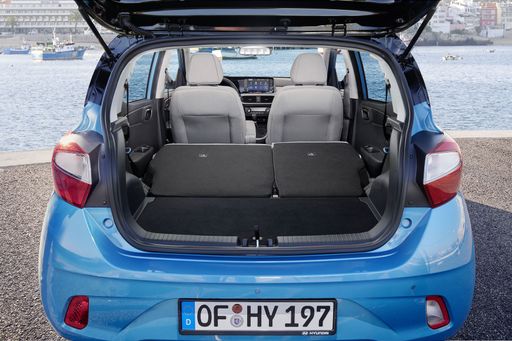 @ hyundai.news
@ hyundai.news

|
|
|
|
|
Costs and Consumption |
|
|---|---|
|
Price
-
|
Price
14600 - 19000 £
|
|
Consumption L/100km
-
|
Consumption L/100km
4.9 - 5.5 L
|
|
Consumption kWh/100km
-
|
Consumption kWh/100km
-
|
|
Electric Range
-
|
Electric Range
-
|
|
Battery Capacity
-
|
Battery Capacity
-
|
|
co2
-
|
co2
110 - 124 g/km
|
|
Fuel tank capacity
-
|
Fuel tank capacity
36 L
|
Dimensions and Body |
|
|---|---|
|
Body Type
-
|
Body Type
Hatchback
|
|
Seats
-
|
Seats
4 - 5
|
|
Doors
-
|
Doors
5
|
|
Curb weight
-
|
Curb weight
996 - 1099 kg
|
|
Trunk capacity
-
|
Trunk capacity
252 L
|
|
Length
-
|
Length
3670 - 3675 mm
|
|
Width
-
|
Width
1680 mm
|
|
Height
-
|
Height
1480 - 1483 mm
|
|
Payload
-
|
Payload
344 - 423 kg
|
Engine and Performance |
|
|---|---|
|
Engine Type
-
|
Engine Type
Petrol
|
|
Transmission
-
|
Transmission
Manuel, Automatic
|
|
Transmission Detail
-
|
Transmission Detail
Schaltgetriebe, Automatisiertes Schaltgetriebe
|
|
Drive Type
-
|
Drive Type
Front-Wheel Drive
|
|
Power HP
-
|
Power HP
63 - 90 HP
|
|
Acceleration 0-100km/h
-
|
Acceleration 0-100km/h
11.4 - 18.4 s
|
|
Max Speed
-
|
Max Speed
143 - 175 km/h
|
|
Torque
-
|
Torque
93 - 172 Nm
|
|
Number of Cylinders
-
|
Number of Cylinders
3 - 4
|
|
Power kW
-
|
Power kW
46 - 66 kW
|
|
Engine capacity
-
|
Engine capacity
998 - 1197 cm3
|
General |
|
|---|---|
|
Model Year
-
|
Model Year
2024
|
|
CO2 Efficiency Class
-
|
CO2 Efficiency Class
C, D
|
|
Brand
-
|
Brand
Hyundai
|
Elaris Jaco
Discovering the Elaris Jaco: A Leap Forward in Electric Mobility
The automotive industry is witnessing an electric revolution, and at the forefront of this transformation is the Elaris Jaco. This impressive vehicle combines cutting-edge technology with remarkable design, offering a glimpse into the future of driving.
Unparalleled Performance and Efficiency
Under the bonnet of the Elaris Jaco lies an electric powerhouse with 218 PS, translating to 160 kW of pure performance. This impressive powertrain provides instant torque of 225 Nm, giving drivers an exhilarating yet smooth driving experience. The Jaco boasts a 0 to 100 km/h acceleration time that's impressively quick, alongside a top speed of 160 km/h, all while maintaining an eco-friendly CO2 efficiency class of A. With zero emissions, this electric marvel is not only a force on the road but also a friend to the environment.
Innovative Design: Marrying Form and Function
Crafted with precision, the Elaris Jaco's design captures attention with its sleek Stufenheck body. Its dimensions, with a length of 4965 mm and a width of 1920 mm, offer a commanding presence. Despite its substantial size, it maintains a compact height of 1520 mm, ensuring agility and manoeuvrability. The Jaco provides a spacious interior with the practicality of a 5-door configuration, comfortable seating for five passengers, and ample luggage space with a 414-litre boot capacity.
Advanced Technological Features
The Elaris Jaco is not just about performance and aesthetics. It is loaded with state-of-the-art technology. Its automatic front-wheel-drive configuration, harnessed through a sophisticated reductions gear system, provides seamless power delivery and efficiency. The vehicle's lightweight structure, with a kerb weight of 1690 kg, is designed to enhance the overall driving experience while accommodating a payload capacity of up to 400 kg. All of this is delivered for a competitive price of €45,900, underscoring the vehicle's value proposition.
Conclusion: A Step into the Future
The Elaris Jaco is more than just a vehicle; it's a statement of the brand's commitment to innovation and sustainability. With its remarkable blend of performance, technology, and environmentally conscious design, the Jaco is set to redefine personal mobility for the modern age. Whether you're an eco-conscious driver or an enthusiast of cutting-edge automotive technology, the Elaris Jaco offers a thrilling ride into the future of driving.
Hyundai i10
Introduction to the Hyundai i10
The Hyundai i10 has consistently proven to be a dependable and stylish companion for urban driving. Known for its compact design and efficiency, this hatchback offers a perfect blend of modern aesthetics and practicality, making it a popular choice for city dwellers and small families alike.
Performance and Efficiency
The Hyundai i10 is available with both manual and automatic transmissions, catering to various driving preferences. Engine power ranges from 63 to 90 PS, providing a versatile driving experience for both novice and seasoned drivers. The fuel consumption varies between an impressive 4.9 to 5.4 litres per 100 kilometres, fitting for those looking to minimise fuel costs while also reducing their carbon footprint.
Engine and Transmission
Equipped with a choice of 1.0-litre or 1.2-litre engines, the i10 offers up to 172 Nm of torque, ensuring lively performance. The models feature front-wheel-drive configurations, allowing for smooth handling and reliable road performance. The car excels in city driving but is equally capable on longer journeys.
Interior and Comfort
Despite its compact size, the Hyundai i10 does not compromise on interior space and comfort. It accommodates four to five occupants comfortably, offering sufficient legroom and headroom. Its flexible seating arrangement and a 252-litre boot make it ideal for both quick trips and weekend getaways.
Safety and Technology
Safety remains a priority with Hyundai, and the i10 is no exception. It comes equipped with multiple airbags, stability control, and advanced braking systems. Technology-wise, the i10 features a user-friendly infotainment system with smartphone connectivity, ensuring a pleasant and connected drive.
Design and Style
The Hyundai i10’s design is both modern and sleek, making it stand out in the compact hatchback segment. With a length ranging from 3670 to 3675 mm, a width of 1680 mm, and a height of 1480 to 1483 mm, the i10 strikes a perfect balance between style and functionality.
Affordable Pricing and Value
The i10 is available in several trims including the Select, N Line, and Prime, among others, with prices ranging from €16,990 to €22,190. Considering its features and low running costs — with monthly expenses estimated between €694 to €793 — the Hyundai i10 offers substantial value for those seeking an economical yet stylish hatchback.
Conclusion
The Hyundai i10 combines efficiency, modern design, and practicality in a compact package. Whether you are seeking a reliable city car or an economical daily driver, the Hyundai i10 is a strong contender worth considering in the compact car market of 2024.
The prices and data displayed are estimates based on German list prices and may vary by country. This information is not legally binding.
